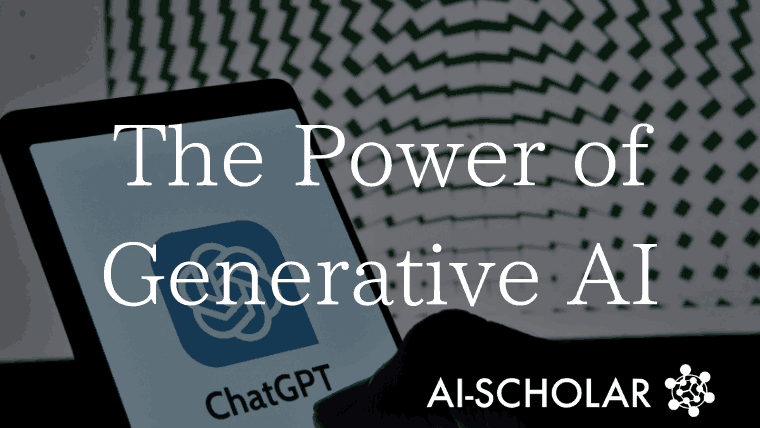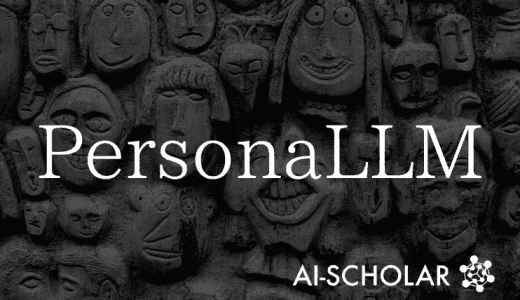
Can Generative AI Be Applied To Research In Different Fields?
3 main points
✔️ A paper examining the advantages and limitations of how ChatGPT and other generative AI can be used in research areas other than information engineering, particularly in social psychology
✔️ Argues for the importance of a theoretical framework to connect with existing social psychology theories
✔️ Chatbot utilization in social psychology research Guidelines for the use of chatbots in social psychology research are introduced.
May the force of text data analysis be with you: Unleashing the power of generative AI for social psychology research
written by Mohammed Salah, Hussam Al Halbusi, Fadi Abdelfattah
(Submitted on 19 July 2023)
Comments: Published on Science Direct.
The images used in this article are from the paper, the introductory slides, or were created based on them.
introduction
Until now, researchers have struggled with manual data analysis and sample size issues, but with generative AI, it is expected to become possible to analyze large amounts of text data and model social interactions.
However, ethical, theoretical, and methodological challenges exist when using generative AI for research. This paper provides an overview of these and examines the advantages and limitations.
The importance of a framework for linking generative AI to existing theories of social psychology will be discussed, and guidelines for researchers to effectively use these tools will be presented.
Applications of ChatGPT in Social Psychology Research
He said several studies have already employed ChatGPT.
For example, [Aydin & Karaarslan, 2022] conducted a study in which they had ChatGPT simulate group online conversations to explore the dynamics of social influence and group decision making.
Also, [Haluza & Jungwirth, 2023] analyzed social media data and used ChatGPT to analyze how emotional expressions affect the way information spreads during political campaigns.
[Mariani, et al., 2022] provide a comprehensive review of the impact of AI on consumer behavior and its potential to influence purchasing decisions and opinion formation. In addition, they call attention to issues of AI misuse, privacy, and disparities, and argue that an ethically responsible approach to AI adoption is necessary.
The Use of Generative AI to Augment Social Psychology Research
Show how ChatGPT can be used to understand human behavior and social phenomena.
( 1) Modeling social interaction
(2) Analyzing large text data
(3) Understanding the cognitive processes that produce social behavior
The following is a description of the three perspectives.
(1) Modeling of social interaction
ChatGPT can simulate a wide variety of social interactions, ranging from information exchange to complex dialogue. These artificial interactions reflect the dynamic nature of human interaction and can serve as the soil for investigating various aspects of social psychology.
AI-generated dialogue is characterized by versatility and extensibility. That is, ChatGPT can generate dialogue between characters with a wide range of opinions, beliefs, and attitudes. This allows researchers to obtain examples of dialogue in controlled scenarios. This is something that is very difficult to do in the real world. Furthermore, since these dialogues can be replicated and modified, they can be used in large studies without compromising parameter consistency.
By tracking the trajectory of AI-generated dialogue over time and understanding the dynamics of these changes, we can investigate what elements of social influence, such as majority and dissenting opinions, are at play.
For example, the simulation will allow us to investigate issues that have been difficult to research in the past, such as what strategies a minority group should adopt to sway the majority opinion.
(2) Analysis of large-scale text data
With ChatGPT, you will be able to analyze huge amounts of text data that you could not handle before. This will enable a different and higher level of analysis.
The vast amounts of textual data from social media and other sources can be used to investigate how certain ideas spread, how different communities react to certain events, and much more [Hassan et al., 2022; Pellert et al., 2023].
These can enrich existing social psychology theories and advocate for more robust models.
It would also allow us to analyze the entire social network. In doing so, we can also investigate the issue of fake news and hate speech.
(3) Understanding the cognitive processes that produce social behavior
ChatGPT can analyze patterns of language use, sentiment, and emotional expression from text data. For example, sentiment analysis of textual data in online reviews and social media posts can be used to investigate the influence of emotion on decision making and social interaction [George & George, 2023].
Such utilization will also allow ChatGPT to extend the field of social psychology research.
As described above, the use of a generative AI such as ChatGPT would greatly advance social psychology research in terms of improving the accuracy and efficiency of data analysis.
Ethical Aspects of Using ChatGPT
While the use of ChatGPT has many advantages, they also need to be aware of ethical issues and limitations. For example, the text generated by AI models may show biases inherent in the training data [Mehrabi et al., 2021]. This could undermine the fairness and validity of the study results.
Also, when using AI in social psychology, it is a good idea to adopt a Corporate Digital Responsibility (CDR) approach for companies. This is a set of norms that govern how an organization handles four processes related to digital technology: technology creation and data acquisition, operations and decision making, inspection and impact assessment, and technology improvement. In accordance with this, the text output of the generated AI must be rigorously evaluated to prevent bias and inaccuracies.
Deepfakes and hallucination (the phenomenon of ChatGPT stating very convincing lies) are also said to be serious problems. Therefore, if we easily follow the explanations of lies created by generative AIs, we could be seriously misleading in our understanding of social phenomena in our research.
The use of ChatGPT in social psychology research is still in its infancy, and researchers need to be aware of ethical issues as the methodology is developed.
Future Possibilities
This section will provide a comprehensive description of methods for using ChatGPT as a tool for social psychological research.
Fast and efficient generation and analysis of text data
This is very useful for analyzing huge amounts of text data, such as social media posts.
New insights into social phenomena
Using ChatGPT, one can gain insight into social phenomena by simulating people's social interactions, such as online conversations.
Identifying patterns and trends in social data
ChatGPT's ability to analyze large text sets makes it possible to analyze social data in ways that are difficult to do manually. It will enable the identification of trends, such as polling public opinion on social and political issues.
Improve accuracy of data analysis
Tasks prone to human error can be automated by ChatGPT. Specifically, corrective data can be automatically classified, thereby eliminating the influence of evaluator bias.
Streamlining data analysis
It will reduce the amount of effort and time spent on data analysis. This would allow the researcher to focus on other tasks.
Facilitate natural language interaction with research participants
It will allow us to simulate a dialogue between the participant and the researcher, which will allow us to design better surveys.
Assistance in accurately predicting behavior
Pattern analysis of social data, for example, will enable more accurate behavior prediction.
Challenges and limitations of current generative AI
The following is an exhaustive list of issues and limitations to be aware of when using ChatGPT and other generative AI for social psychology research.
Bias issues arising from training data
This was mentioned earlier. We need to recognize that bias will occur and try to remove as much of it as possible.
Limitations of Interpretation of Social Context
We do not yet have the ability to fully understand the social context. Thus, it is not possible to capture nuances such as irony and culture-specific signs. These aspects must also be recognized.
creativity
ChatGPT may not yet be used for studies that relate to human creativity and intuition.
Black box issue
AI models such as ChatGPT are black box models that do not provide insight into internal processing. This lack of transparency complicates the issues of assessing the accuracy, reliability, and bias of the generated text.
misinformation
The data generated by AI models such as ChatGPT, while seemingly plausible, is in fact often misinformed.
Respect for data ownership and intellectual property
Guidelines for data ownership, copyright, and intellectual property rights should be established.
Guidelines for Effective and Ethical Deployment of Chatbots in Social Psychology
This section provides a comprehensive overview of how social psychologists can use chatbots ethically and effectively in their research activities.
Reduce bias in training data
Careful selection and pre-processing of training data is necessary. It should also be checked for discriminatory content. It is always a good idea to keep a close watch.
Reinforces understanding of social context
We should explore ways to incorporate irony and cultural norms into training data to enhance understanding of social context.
Ensure transparency and interpretability of algorithms
We should study the operation of AI systems and processing processes so that they can be more transparent and interpretable.
Be cautious about sensitive topics.
When dealing with sensitive topics, the experimental system should be carefully thought out.
Prioritizing informed consent and privacy
Make sure that the participants in the experiment fully understand the methods of data collection, storage, and analysis. Make sure that data protection measures are also robust.
Verification of generated data
Rigorously validate the data generated by the chatbot in terms of accuracy and reliability. You may want to use feedback from experts or participants in the experiment.
Transparency and reproducibility
Detailed information regarding chatbot development, training data, and operation should be provided. Research methods and analysis procedures should also be presented in a manner that can be replicated by other researchers.
Ethical guidelines and best practices
Researchers need to keep up with the latest ethical guidelines, best practices, and technological advances. To do so, they should take advantage of opportunities to connect with experts and attend conferences.
summary
The paper presented here gave us a comprehensive lesson in terms of advantages, challenges, and guidelines on how to utilize ChatGPT and other generative AI for social psychology research.
It seems that the successful incorporation of generative AI in fields other than information engineering has the potential to greatly expand the field of research.
We hope that through this article, you will find some hints to help you in your work and research.
Categories related to this article




![[JMMLU] Prompt Polit](https://aisholar.s3.ap-northeast-1.amazonaws.com/media/July2024/jmmlu-520x300.png)



